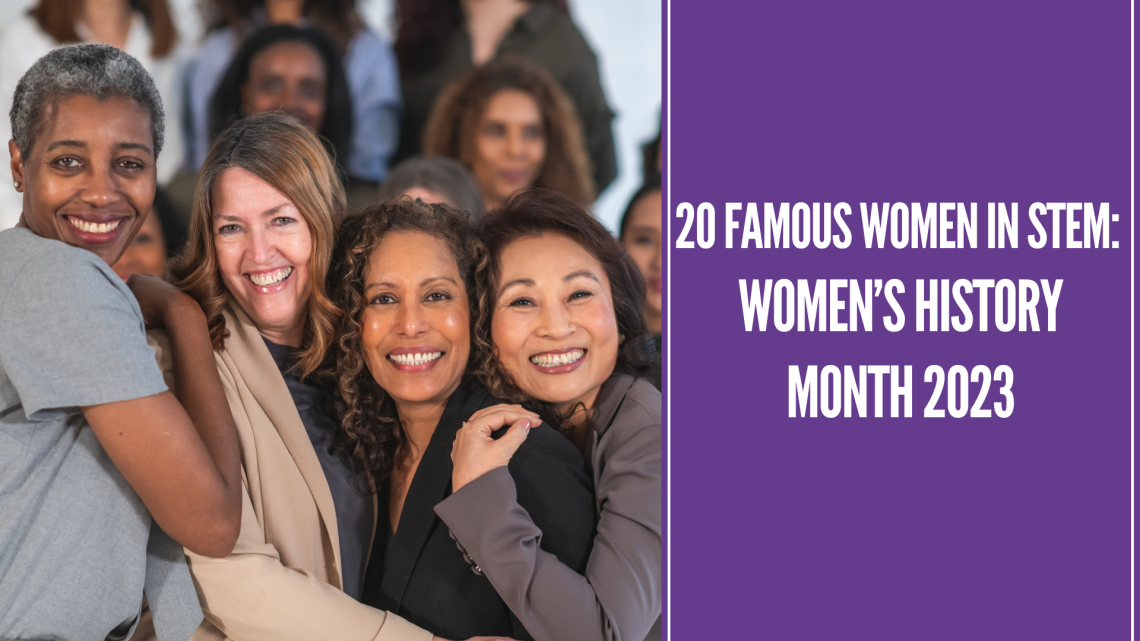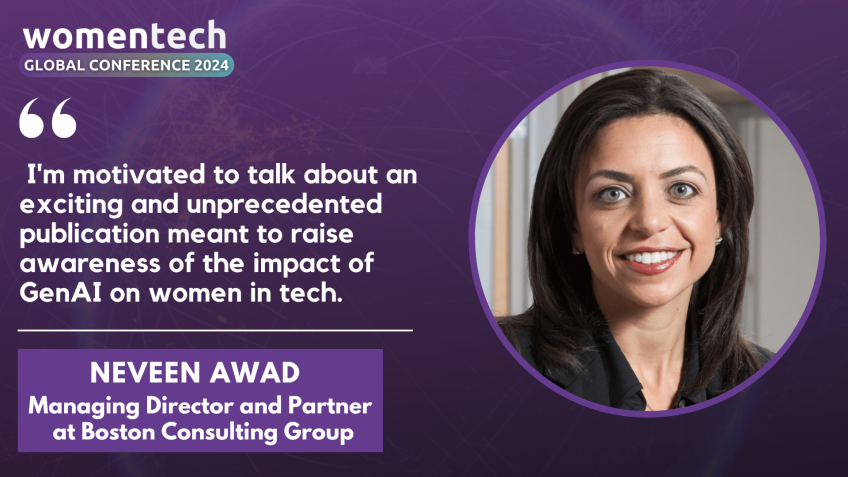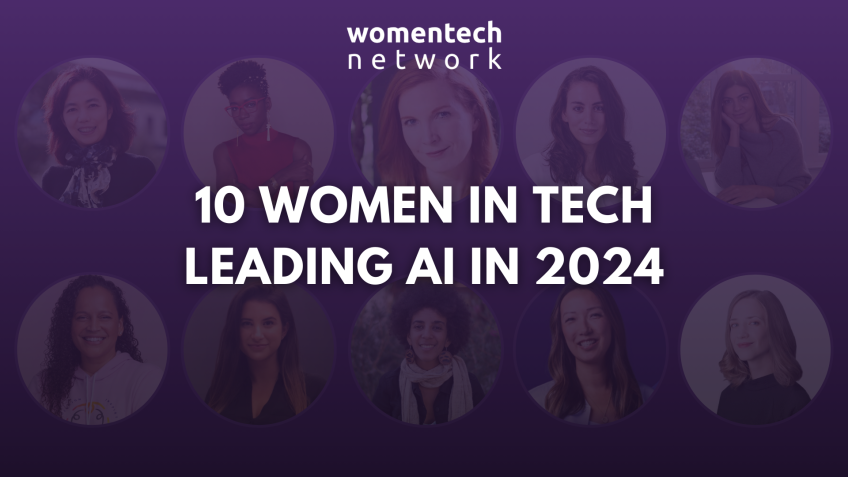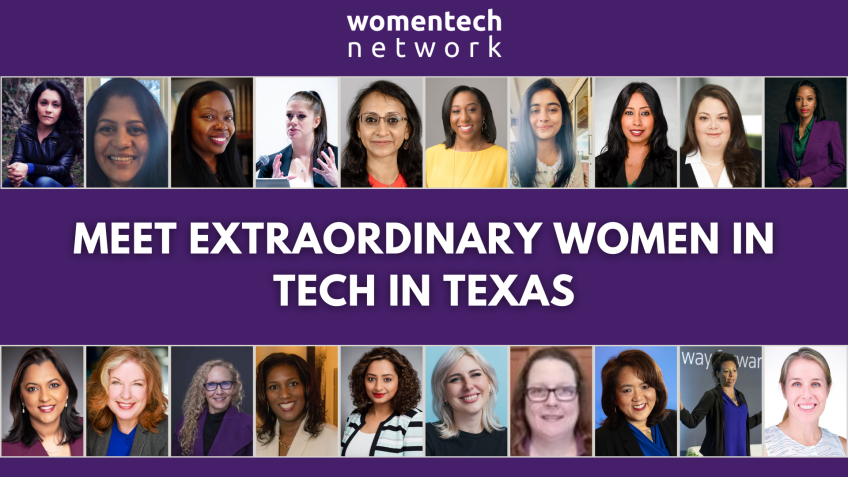
Throughout history, numerous female pioneers have made remarkable contributions to Science, Technology, Engineering, and Mathematics that were not acknowledged. This overshadowed the presence of females in the STEM field that has largely favored men since day one - unfortunately causing only a few women to be remembered for their achievements and the perpetuation of a culture that favors male dominance in this area rather than promoting gender equality.
It is vital to shift this culture to draw more talented women into STEM fields. Now is the perfect time to recognize the remarkable female professionals who are making significant contributions toward advancing science, technology, engineering, and mathematics.
Here are 20 famous women in STEM 2023, ordered alphabetically.
1. Ami Bhatt
Dr. Ami B. Bhatt is an accomplished clinical cardiologist, investigator, and educator who serves as the Director of Adult Congenital Heart Disease Program at Massachusetts General Hospital. Under her leadership, the program has gained international recognition for its multidisciplinary infrastructure and a world-class team of heart specialists. Dr. Bhatt's efforts also extend to patient education and prevention through the MGH ACHD Health & Wellness program. Her research, education, and work building clinical guidelines have earned her national recognition, and she is also an innovator in telemedicine and mobile health technologies. As Director of Outpatient Services for the MGH Cardiology Division, Dr. Bhatt focuses on enhancing patient-centered outcomes through multidisciplinary care.
2. Angelica Ross
Angelica Ross is a remarkable American actress, businesswoman, and advocate for transgender rights. Her journey in the technology industry began when she taught herself how to code, leading her to specialize in web management. In 2014, Ross established TransTech Social Enterprises, a nonprofit organization that provides training and employment opportunities to transgender and other workers in creative design. Her dedication to her work was recognized when she was named the first "Foot Soldier" of the year on Melissa Harris-Perry's show in 2015. She was also invited to speak at the White House LGBTQ Tech and Innovation Summit the same year. Ross continued to break barriers by hosting the 2020 Presidential Candidate Forum on LGBTQ Issues in 2019, making her the first openly transgender person to do so. She was also a featured speaker at the National Trans Visibility March in Washington D.C. that same year, inspiring many with her advocacy and leadership.
3. Ayanna Howard
Dr. Ayanna Howard is a distinguished individual who has made significant contributions to the field of engineering. As the current Dean of The Ohio State University College of Engineering, she is the first woman to serve in this role. Dr. Howard holds degrees from prestigious institutions such as Brown University, the University of Southern California, and Claremont Graduate University. Her accomplishments include being recognized on Forbes' America's Top 50 Women In Tech list and receiving the ACM Athena Lecturer Award in 2021. Throughout her career, she has been involved in higher education, NASA’s Jet Propulsion Laboratory, and the private sector. Dr. Howard founded and directed the Human-Automation Systems Lab (HumAnS), which generated over 250 publications and $8.5 million in research funding. In addition, she founded and served as president of Zyrobotics, a spin-off company that develops mobile therapy and educational products for children with special needs based on her research. Dr. Howard has also been an active advocate for diversifying engineering professions, with a particular focus on women, underrepresented minorities, and individuals with disabilities.
4. Carolyn W. (“Carol”) Greider
Carolyn Widney Greider is a renowned molecular biologist and Nobel laureate, currently holding the position of Distinguished Professor in the department of molecular, cell, and developmental biology at the University of California Santa Cruz. Greider made a groundbreaking discovery in 1984 while studying under Elizabeth Blackburn at UC Berkeley, uncovering the telomerase enzyme responsible for protecting telomeres from shortening. This discovery earned her the Nobel Prize for Physiology or Medicine in 2009, which she shared with Blackburn and Jack W. Szostak. Greider's impressive career includes holding the Bloomberg Distinguished Professorship at Johns Hopkins University and serving as the Daniel Nathans Professor and Director of Molecular Biology and Genetics at Johns Hopkins Medicine. In her lab, Greider and her team use interdisciplinary research with student and postdoctoral trainees, yeast, mice models, and biochemistry tools to explore the nexus between telomere biology and disease.
5. Cynthia Breazeal
Cynthia Breazeal is a highly regarded professor at MIT, who has made significant contributions to the field of robotics. She is a co-founder of Jibo and established the Personal Robotics group at MIT. Her research centers around the impact of AI and social robots on everyday life. In light of the pandemic, Breazeal created a website with activities to support parents and teachers during quarantine. Her achievements have been recognized by the AAAI, which awarded her the AAAI Fellow in 2020. Recently, she was appointed as the dean for digital learning at MIT, marking another milestone in her impressive career.
6. Dawn Song
Dr. Dawn is a renowned computer security expert who has made significant contributions in the areas of software, networking, cryptography, blockchains, smart contracts, and machine learning. She is the Founder of Oasis Labs and a professor at UC Berkeley. With an impressive list of achievements, Dawn has been recognized with prestigious awards such as the MacArthur Fellowship, Guggenheim Fellowship, Sloan Research Fellowship, and MIT Technology Review TR-35 Award. Her work has also won Best Paper Awards from leading conferences in computer security and deep learning. She is a serial entrepreneur, having founded Ensighta Security and Menlo Security, both of which have been highly successful. Dawn obtained her PhD from UC Berkeley and is currently ranked as the most cited scholar in computer security by the AMiner Award.
7. Elizabeth Blackburn
Elizabeth Helen Blackburn, a Nobel Prize-winning Australian-American scientist who previously served as the president of the Salk Institute for Biological Studies, is well-known for her extensive research on telomeres - protective structures located at the ends of chromosomes. Blackburn conducted biological research at the University of California San Francisco before becoming the President of the institute. Together with Carol W. Greider, she co-discovered telomerase in 1984 - an enzyme critical to cell growth that restores telomeres. This significant achievement led to Blackburn being awarded the Nobel Prize in Physiology or Medicine in 2009, which she shared with Greider and Jack W. Szostak, making her the first Australian woman to receive this prestigious award. In addition to her scientific work, Blackburn also tackled ethical issues in medicine. Currently, as a leading researcher at the University of California San Francisco, Blackburn's laboratory investigates the effects of inadequate telomere maintenance on cellular aging and its link to long-term illnesses. The lab's research aims to uncover the consequences of limited telomerase enzyme levels on cell division, cycling, and growth rates.
8. Eva Jablonka
Eva Jablonka, a distinguished Israeli evolutionary theorist and geneticist, has been captivating the public with her pioneering work on epigenetic inheritance since 1957. As a professor at Tel Aviv University's Cohn Institute for History of Philosophy and Science, she has received numerous accolades, including the prestigious Landau Prize of Israel in 1981 and 1988. Together with her associate Lamb, Jablonka argued that epigenetic control mechanisms are essential for initiating evolutionary modifications. In their newly-published book co-authored by Simona Ginsburg titled The Evolution of the Sensitive Soul: Learning and the Origins of Consciousness, they put forth that learning is at the crux of basic consciousness. In their ground-breaking work, Picturing the Mind: Consciousness through the Lens of Evolution (Jablonka & Ginsburg, 2022), two renowned authors delve into thought-provoking questions about consciousness and propose ambitious ideas such as extraterrestrial sentience or Artificial Intelligence. Moreover, they also explore humanity's unique qualities in terms of tool use aptitude; music composition skills; understanding of its own selfhood awareness; language symbolism capacity; among other attributes.
9. Fei-Fei Li
Dr. Fei-Fei Li works at the Computer Science Department of Stanford University and also serves as the Co-Director of the Human-Centered AI Institute. She obtained a Bachelor's degree from Princeton University and completed her PhDs in electrical engineering at Caltech. Additionally, Harvey Mudd College has awarded her an honorary doctorate. Dr. Li has a wide range of research interests that include various areas such as cognitively inspired AI, machine learning, deep learning, computer vision, and AI+healthcare. Dr. Li is credited with inventing the ImageNet Challenge, and she is also a co-founder and chairperson of the national non-profit organization AI4ALL. This organization strives to promote inclusion and diversity in AI education. Dr. Li has received many awards, such as the National Geographic Society Further Award 2019 and the IEEE PAMI Thomas Huang Memorial Prize 2019. She is also a member of prestigious academies such as the National Academy of Engineering (NAE) and the National Academy of Medicine (NAM). Furthermore, Dr. Li's exceptional work and leadership in AI have been recognized, and she has been featured in ELLE Magazine's 2017 Women in Tech list.
10. Helen Margaret Blau
Dr. Helen Margaret Blau is a highly accomplished biologist with a distinguished academic career. She received her Bachelor's degree from the University of York and completed her Masters and Ph.D. in Biology at Harvard University. Dr. Blau has been a member of the faculty at Stanford University since 1978 and has been serving as the Director of the Baxter Laboratory for Stem Cell Biology since 2002. Her remarkable research has challenged the conventional notions of mammalian differentiation and has significantly impacted the scientific community's understanding of this field. In addition to her groundbreaking contributions to science, Dr. Blau is dedicated to promoting and supporting women in science and mentoring young scientists in the fields of muscle biology and regenerative medicine.
11. Jennifer A. Doudna
Jennifer Anne Doudna is a prominent American biochemist and professor at the University of California, Berkeley, who has revolutionized the field of gene editing with her pioneering work on CRISPR-Cas9 technology. Her contributions to this field have been recognized with several prestigious accolades, including the Nobel Prize in Chemistry, Breakthrough Prize, and Gruber Prize. Doudna is also a co-founder of the Innovative Genomics Institute (IGI), which uses CRISPR technology to conduct Covid-19 testing, processing over 1,000 patient samples daily. Her partnership with Mammoth Biosciences led to the successful validation of a cost-effective point-of-need diagnostic test for COVID-19 using CRISPR technology, which marks another significant milestone in the fight against the pandemic.
12. Katherine Freese
Katherine Freese is a distinguished physicist. She currently occupies the Jeff and Gail Kodosky Endowed Chair in Physics at the University of Texas at Austin. Her contributions to theoretical astrophysics have earned her worldwide recognition. She is renowned for her groundbreaking work in particle physics and cosmology, particularly her early investigations into dark matter and energy. Her ideas for the indirect detection of dark matter on Earth and her "wind" theory have proven successful. She challenged Einstein's equations with her Cardassian expansion theory and proposed a new way to fuel stars using Dark Matter annihilation in her 'Dark Star' proposal. Her natural inflation model, backed by axionic-type particles, was confirmed by Planck Satellite data in 2013. She has also been an active member of several prestigious scientific boards and committees worldwide.
13. Kizzmekia Corbett
Dr. Corbett is a viral immunology expert who developed the leading vaccine against SARS-CoV-2, mRNA-1273, with her NIH team. The vaccine's Phase 3 trials showed an efficacy of 94.1%, and it has been authorized for use in multiple countries. Dr. Corbett's patent portfolio includes universal coronavirus and influenza vaccine concepts, and she has received numerous prestigious awards for her research and advocacy work. She invests much of her time in underserved communities as an advocate for STEM education and vaccine awareness.
14. Maryna Sergiivna Viazovska
Dr. Maryna Sergiivna Viazovska is a highly accomplished mathematician who holds a full professorship at the École Polytechnique Fédérale de Lausanne. Her work on sphere-packing in dimension 8, which she published in 2016, astounded the mathematics community and earned her worldwide recognition. Viazovska's collaboration with Bondarenko and Radchenko in verifying Korevaar and Meyers' conjecture regarding small designs in all dimensions also won her the Salem Prize that same year. Viazovska has received numerous other awards and accolades for her contributions to mathematics, including the Clay Research Award, SASTRA Ramanujan Prize, and New Horizons Prize in Mathematics in 2018. In 2022, she made history as the second woman ever to receive the prestigious Fields Medal and was included in BBC Women's list of 100 most inspiring women.
15. Nergis Mavalvala
Nergis, a Pakistani woman with a passion for engineering and science, moved to the United States to pursue her academic goals. With a Bachelor's degree from Wellesley College and a PhD from MIT, she became a professor of astrophysics at MIT in 2002 and is now the Dean for MIT’s School of Science. Her research focuses on detecting gravitational waves, and she played a key role in the first direct detection of gravitational waves in 2016. Nergis is a world-leading expert in this field and has received numerous awards for her scientific contributions, including a MacArthur fellowship. She is an openly queer Pakistani woman with two children and participates in mentorship programs for LGBTQ+ people. She also enjoys sports such as squash and cycling, which have played a role in her success in her career.
16. Radhika Nagpal
Dr. Radhika Nagpal is a renowned Professor in Robotics at Princeton University, holding a joint position between the departments of Mechanical and Aerospace Engineering and Computer Science. With multiple awards under her belt, including the Microsoft New Faculty Fellowship, NSF Career Award, Anita Borg Early Career Award and AAAI/ACM Fellow, Nagpal is recognized for her contributions to Swarm Robotics and Collective Intelligence research. Her lab focuses on topics such as bio-inspired robots, decentralized algorithms/theory, models for self-organization, and swarm programming. Nagpal is also the co-founder of ROOT Robotics, an educational robotics company, and has had commercial success with the Kilobots, which were sold worldwide by K-Team Inc. She is also known for her involvement in mentoring networks, diversity issues within Robotics/CS/Academia, and civic engagement/social justice outside of research.
17. Rana el Kaliouby
Rana is an accomplished scientist, entrepreneur, and AI thought leader, with a diverse portfolio of achievements. As the former CEO and Co-Founder of Affectiva, she successfully raised over $50 million in venture capital, and her Emotion AI technology has reached more than 90 countries. Rana is a passionate advocate for ethical AI development and data privacy standards to mitigate bias. She is also an active member of industry organizations such as the Partnership on AI and the World Economic Forum’s Council of Young Global Leaders. Her commitment to diversity and inclusion in tech is reflected in her involvement with All Raise's Boston Steering Committee and the Young President's Organization (YPO). Rana's impressive credentials include a Ph.D from Cambridge University, a Post Doctorate from MIT, being featured on Fortune’s 40 Under 40 list and Forbes' Top 50 Women in Tech, as well as hosting TED talks and a PBS NOVA series on AI.
18. Sandra Faber
Dr. Sandra Moore Faber is a pioneering figure in the field of astrophysics and a respected University Professor of Astronomy and Astrophysics at the University of California Santa Cruz. Her numerous achievements include being the first female faculty member at Lick Observatory in 1972, discovering the Faber-Jackson relation in 1976, and providing scientific evidence for the existence of dark matter in 1979. Dr. Faber has also made significant contributions to the advancement of telescope technology, having assisted in the commissioning of the Hubble Space Telescope's Wide Field Planetary Camera and developed an optical spectrograph for Keck II telescope in 1996. Throughout her career, Dr. Faber has led research on galaxies formation and evolution, as well as the expansion of the cosmos. Her leadership and expertise have also led her to be appointed as the Interim Director for the University of California Observatories in 2012.
19. Wendy L. Freedman
Wendy Laurel Freedman is a renowned astronomer who holds the distinguished position of John & Marion Sullivan University Professor of Astronomy and Astrophysics at the University of Chicago. She gained widespread recognition for her work as co-leader of the Hubble Space Telescope Key Project, which aimed to precisely determine the distance scale of the Universe and accurately compute its expansion rate. Freedman's research group accomplished the remarkable feat of calculating the Hubble constant with an impressive accuracy of 10%. Besides her academic contributions, Freedman also served as Director of two esteemed observatories, namely the Carnegie Observatories in Pasadena, California, and the Las Campanas Observatory in Chile.
20. Yvonne Cagle
Dr. Yvonne Darlene Cagle is an accomplished astronaut for NASA and a consulting professor at Stanford University, where she works with the cardiovascular medicine and electrical engineering departments. She has received multiple awards for her medical career and contributes to a longitudinal study on astronaut health. As the head scientist of NASA's Level II Program Office and the leading liaison between Stanford University and notable Silicon Valley companies such as Google, Dr. Cagle is an invaluable asset in space exploration research.
These remarkable women are a source of inspiration for all aspiring female STEM professionals. Their successes show us that being an expert in STEM is not exclusively a man's domain. Let's take the opportunity to revolutionize our culture, and challenge sexism across tech.






